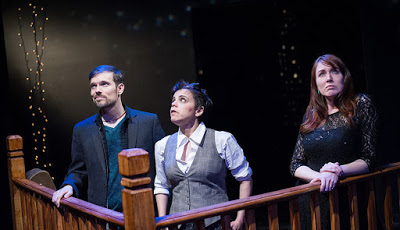‘The Pavilion’ explores the human spirit
 |
| From the left: Matt Bassett, Nora Achrati, and Helen R. Murray in “The Pavilion.” [C. Stanley Photography] |
By David Siegel
Aching and raw, sweet and lamenting, Hub Theatre’s production of “The Pavilion” is a master class of three D.C.-area actors in command of playwright Craig Wright’s lyrical, melodic language about love, loss, regret, and mercy. There are even vital shout-outs about the formation of the universe. Yup, the universe.
Under the capable, softly sculpting hands of director Kelsey Mesa, “The Pavilion” is one exceedingly appealing, rather seductive production exploring the human spirit and its resilience. There is also plenty of lively, brash humor, and frank shredding of one self-absorbed character.
But most of all, “The Pavilion” is a success because of the artistic talents of actors Nora Achrati, Matt Bassett, and Helen R. Murray. They do something well beyond using their voices to speak dialogue. They have a profound ability to punctuate words with assertive physical and facial expressions whether speaking a line, listening to a line, or eavesdropping as another takes center stage.
So, what’s “The Pavilion” all about? First off, Wright (whose credits include the plays “Melissa Arctic” and “Recent Tragic Events,” along with TV’s “Six Feet Under”) clearly knows his way around the territory of human feelings, using magical realism as his theatrical tool.
“The Pavilion” has the simplest of starting points: the 20th reunion of the class of 1998 from a small-town Minnesota high school. The characters put up false fronts to present success and happy marriages – but only until alcohol-fueled truth-telling begins, along with the appearance of crumbling body language.
The reunion venue is a famous local haunt of the now 38-year-old alumni called the Pavilion. Now headed for the wrecking ball in the name of fresh development, it’s a chapel of good memories for the alumni about to disappear from their lives.
Wright focuses attention on Peter, played by Matt Bassett with the conviction of a self-centered man with a yearning for the past and an insistent hope for a brighter future. For most of the drama, he is simply unable to understand his great betrayal to his high school love.
Outwardly a success as a big-city psychologist, he has made a mess of his inner life. Returning to his hometown, he has dreams of winning back his old sweetheart Kari, played by Helen R. Murray. Kari is the girl Peter left behind without a decent reason and without the decency to even explain it to her before he left.
As Kari, Murray completely empties herself on stage with piercing looks and silences that go along with potent words of pain, hurt, and wisdom, such as her suffering through 20 years of “pain, beyond hurt, and it is vast and it’s endless.” Murray has an assured ability to sometimes slump, sometimes appear in a downwardly spiraling posture that boldly underlines her character’s sorrows. When she speaks a line to the needy, lonely Peter, she tells him “you ruined my life” with utter vitality.
Then there is the energy of Nora Achrati, who plays a host of characters. As the all-important Narrator, Achrati sets the production in motion with an opening monologue ranging from the beginnings of the universe to the present-day 20th reunion. She is an Old Testament prophet holding forth to a rapt audience, or perhaps a modern scientist with pizzazz, not algorithms.
She is an expert at quickly changing her voice and her physical mannerisms, so her 10 different characters, male and female, are discernable whenever they appear.
The set design is a minimal one, with hanging strands of white lights and a number of round paper lanterns of various sizes, representing planets, and some twinkling star features, along with some moveable railings and a sitting area. It is all that is needed.
I do want to highlight Evan Cook’s sound design. His selections of music and songs lift and illuminate characters and scenes.
So, can Peter and Kari find a way to put things right after so many years apart? Will there be forgiveness for past wrongs? Can a life together begin anew? Hub audiences get to witness answers to these and more, including this particular one I found most engrossing: Do we become what we become by remembering or forgetting?
Where and When: “The Pavilion” runs through April 6-15 at The Hub Theatre, performing in the New School, 9431 Silver King Court, in Fairfax. Shows are Fridays at 8 p.m., Saturdays at 2 and 8 p.m., and Sundays at 2 and 7 p.m. Purchase tickets online or at the door.
This piece is based on a review that appeared in DC Metro Theater Arts.

